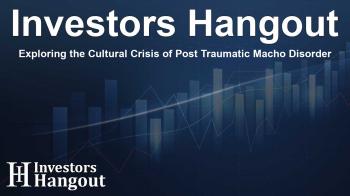Exploring the Cultural Crisis of Post Traumatic Macho Disorder

Understanding Post Traumatic Macho Disorder
Renowned counselor and author Roberto Schiraldi presents an exploration into the dynamics of masculinity and its effects in his enlightening work titled "Post Traumatic Macho Disorder: The Way Home (The Greatest Threat to Our Planet / Awakening From The Nightmare)." This substantial endeavor unravels the complexities of trauma and emotional health in relation to traditional views on masculinity.
Decoding the Psychological Impact
In his book, Schiraldi defines Post Traumatic Macho Disorder (PTMD) as a pervasive condition stemming from rigid masculine stereotypes that contribute to societal and personal emotional damage. He argues that this disorder, while perhaps not yet widely recognized as a clinical diagnosis, represents a significant cultural and emotional crisis that has impacted men throughout history.
PTMD is not just an individual affliction; rather, it is portrayed as intergenerational, deeply rooted within patriarchal frameworks that reward aggressive behavioral traits while penalizing emotional vulnerability. Schiraldi emphasizes that the underlining issues of unhealed emotional wounds related to masculinity contribute directly to many global challenges, including sexism, racism, xenophobia, and other forms of discrimination.
Embracing Vulnerability as Strength
Schiraldi passionately advocates that men need to embrace and vocalize their emotions without fear of being perceived as weak. He asserts that skills such as compassion, empathy, and intuition are fundamental for achieving a balanced and fulfilling life. Adhering to toxic ideals results in a suppression of emotional expression, leading to negative personal and societal repercussions.
The Journey Towards Healing
At the heart of Schiraldi's message lies the belief that healing from PTMD is not only achievable but essential. The title of his work, “The Way Home,” serves as a metaphor for the journey back to one’s authentic self, free from the constraints imposed by traditional masculine norms. He highlights the importance of supportive communities where men can share their experiences and support one another in a nurturing and safe environment.
He invites readers to regard this journey as both a personal endeavor and a collective mission toward healing within the community. By addressing the internal fears, denials, and hatreds, humanity can promote a more compassionate world where emotional wellness thrives.
Community Connection is Key
Schiraldi insists that confronting these emotional challenges cannot be done in isolation. Men are encouraged to come together in supportive spaces, facilitating a dialogue where openness and accountability can flourish. The act of sharing personal struggles can significantly lessen the psychological burden, allowing for a more profound healing process.
A Vision for Real Change
The concluding chapters of the book challenge readers to shift their perspective. Instead of viewing threats to our existence as solely external, Schiraldi proposes that the true threats arise internally—rooted in fear, hostility, and a denial of emotional truth. He envisions a world where unhealed wounds are addressed, leading to mutual compassion and sustained environmental stewardship.
“Post Traumatic Macho Disorder: The Way Home” highlights a pivotal bend in the road for men striving to dissolve the constraints of outdated masculine ideals. The book champions a shift towards embracing emotional richness, fostering community connections, and advocating for vulnerability as a pathway to a more meaningful and healthier existence.
Frequently Asked Questions
What is Post Traumatic Macho Disorder?
Post Traumatic Macho Disorder (PTMD) refers to the psychological and emotional damage linked to traditional masculine norms, impacting men's emotional health and societal behaviors.
Who is the author of the book?
The book is authored by Roberto Schiraldi, a licensed professional counselor with extensive experience in trauma therapy and racial justice advocacy.
What is the central theme of the book?
The central theme revolves around recognizing and healing from the emotional wounds inflicted by rigid masculine ideals, promoting vulnerability and community support.
How can healing from PTMD be achieved?
Healing from PTMD involves acknowledging and expressing emotions, forging supportive connections with others, and transforming harmful conditioning into a healthier emotional framework.
What can readers expect to learn from the book?
Readers will gain insights into the importance of emotional health, the impact of cultural norms on masculinity, and the pathways to creating a compassionate society.
About The Author
Contact Olivia Taylor privately here. Or send an email with ATTN: Olivia Taylor as the subject to contact@investorshangout.com.
About Investors Hangout
Investors Hangout is a leading online stock forum for financial discussion and learning, offering a wide range of free tools and resources. It draws in traders of all levels, who exchange market knowledge, investigate trading tactics, and keep an eye on industry developments in real time. Featuring financial articles, stock message boards, quotes, charts, company profiles, and live news updates. Through cooperative learning and a wealth of informational resources, it helps users from novices creating their first portfolios to experts honing their techniques. Join Investors Hangout today: https://investorshangout.com/
The content of this article is based on factual, publicly available information and does not represent legal, financial, or investment advice. Investors Hangout does not offer financial advice, and the author is not a licensed financial advisor. Consult a qualified advisor before making any financial or investment decisions based on this article. This article should not be considered advice to purchase, sell, or hold any securities or other investments. If any of the material provided here is inaccurate, please contact us for corrections.

